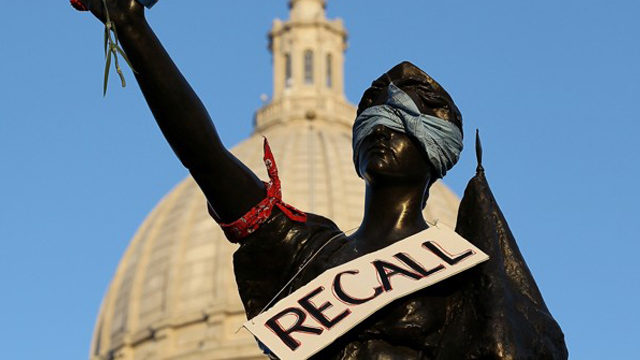Hey, look: there’s an elephant in the room
As it’s been a slow week for Canadian journalism (scandals), it looks like we’ll be leaning on America again for a source of ethical debate. This time, we shift to Wisconsin, where 25 Gannett employees have been called out in print by their publisher for signing a petition seeking the recall of Governor Scott Walker.
Someone needs to explain—clearly, and preferably without yelling—how thinking and believing Walker should be recalled is so different from putting one’s name on a sheet. True, it may mean that said journalist is more out front with his biases, and perhaps even to an audience-insulting degree—that’s up to the discretion of the editors or publishers. But coming out against the principle of a “professional” journalist exhibiting a political opinion has always seemed a little patronizing to me; it’s as though the publishers assume readers are too stupid to think beyond the text and consider what biases may lie in or behind the writing—and biases will always show, whether you want them to or not. Respectable in archaic intent as Corrado may be, positions like his give the appearance of impartiality—which is unachievable, thank God—instead of the actual thing. It’s the idea that we should read with an elephant in the room. What if a journalist didn’t sign the petition, but wrote a column expressing similar sentiments? Is his other reportage then tainted as well? (Makes you wonder what would happen if a politician decided to do away with the collective bargaining rights of journalists. Who’ll write the news?)
The ironic thing is that Gannett is deciding not to release the names of the signatories, which seems to render the whole “transparency” idea rather moot. (Also, as pointed out on The Guardian’s blog, Corrado’s letter to readers was also published in other Gannett papers, with different bylines—though this seems to have been corrected now.)
In the upcoming issue of the Review, so lovingly put together by us all, there are a few feature stories that concern these types of dilemmas—specifically, when (and if) it’s okay for a journalist to cross the line and become something more (or less). There’s something to be said for the idea that journalists’ opinions could carry some well-reasoned weight (talking to people and finding their little facts, as they tend to do). One shouldn’t necessarily express one’s biases frivolously if such weight is to be maintained, of course. But this petition wasn’t (isn’t—an election is anticipated) a frivolous request. If you’ve got something to say, say it—you’re already thinking about it.
Lead image via Justin Sullivan/Getty Images















